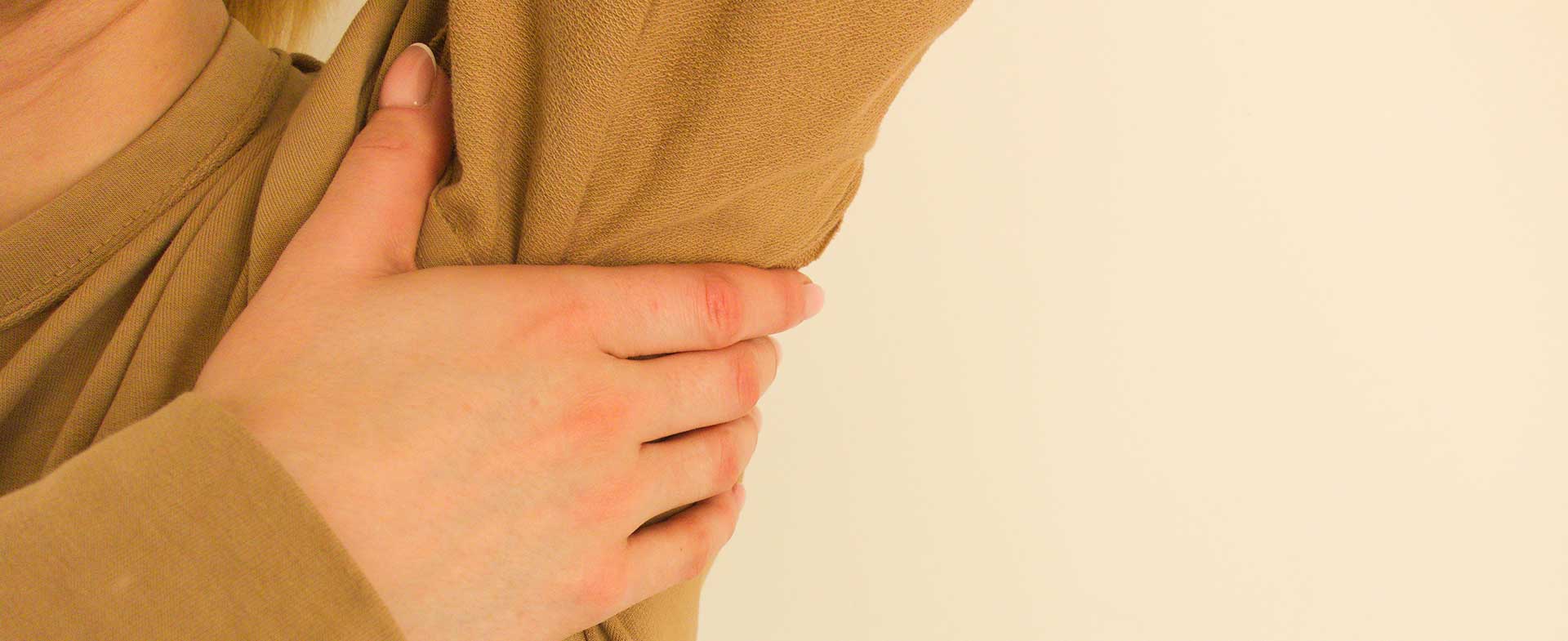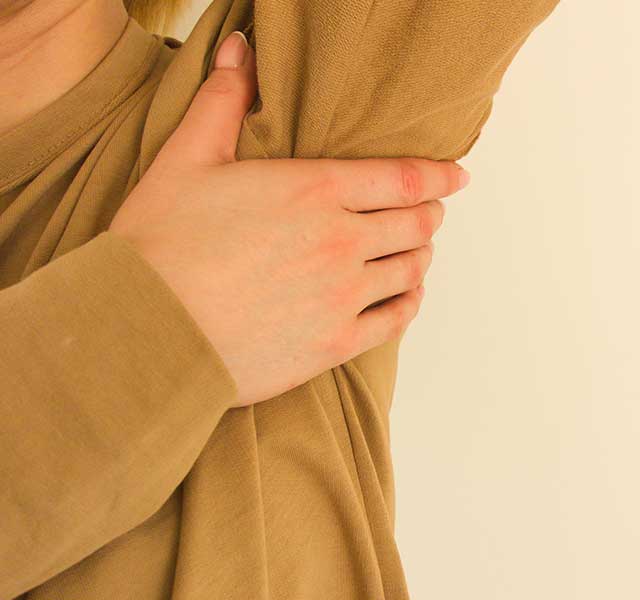Hidradenitis suppurativa is a chronic skin disease that causes painful lumps in the armpits, breasts, groin, inner thighs, lower abs and buttocks. (It commonly occurs in areas where two skin surfaces rub together.) It affects around 1% to 4% of the population in the United States and worldwide.
“People who have hidradenitis suppurativa have a low quality of life compared to patients with other skin diseases,” says Indra Adrianto, Ph.D., an associate scientist in the Department of Public Health Sciences at Henry Ford Health. “Hidradenitis suppurativa is not acne, it’s not contagious, it’s not a sexually transmitted disease and it’s not due to poor hygiene. But people are afraid to go to the dermatologist for these reasons. They don’t get the treatment they need and so it gets worse.”
Here, what we know so far about this skin condition.
Q: What Is The Cause Of Hidradenitis Suppurativa?
A: “The exact cause is still unclear, but we know it is an inflammatory disease,” says Qing-Sheng Mi, M.D., Ph.D., Director for Cutaneous Biology and Immunology at Henry Ford Health. He is leading a research team that’s conducting studies to learn more about hidradenitis suppurativa. “In hidradenitis suppurativa patients, their immune system is overactive, which causes inflammation. It is likely due to a combination of hormones, genetics, microbiome disruptions, metabolism and other environmental factors.”
Q: What Are Risk Factors For Hidradenitis Suppurativa?
A: “Hidradenitis suppurativa predominantly affects females—with a female to male ratio of about 3:1,” says Dr. Adrianto. “It also disproportionately affects Black people in both prevalence and severity. We are investigating why that is.”
Other risk factors include:
- Genetics. More than 30% of hidradenitis suppurativa report a family history of the disease.
- Smoking. Cigarette smoking is associated with hidradenitis suppurativa. Right now, it’s unclear whether smoking cessation is linked with an improvement in the disease.
- Body weight. Some types of hidradenitis suppurativa affect people who are overweight.
- Age. Hidradenitis suppurativa often develops in the mid-teen years, but it can also begin in the mid-40s.
Q: Are Those With Hidradenitis Suppurativa More Likely To Have Other Health Conditions As Well?
A: “Hidradenitis suppurativa patients are more likely to have diabetes, hypertension, high cholesterol, heart disease, stroke and autoimmune diseases like psoriasis, arthritis and inflammatory bowel disease,” says Dr. Adrianto. “Because of the appearance of this condition, it can affect their mental health and cause anxiety or depression, too.”
Q: What Are The Treatment Options For Hidradenitis Suppurativa?
A: “We can use over-the-counter anti-inflammatory drugs such as aspirin and ibuprofen to ease pain and reduce swelling,” says Dr. Adrianto. “We can also use antibiotics to fight infections in the areas that have abscesses or bumps. Topical steroids can also reduce inflammation. There is one FDA-approved drug called adalimumab that suppresses the immune system to stop inflammation.”
“Multiple off-label medications can also dramatically assist patients, which are offered at specialty centers,” adds Iltefat Hamzavi, M.D., a senior staff physician at Henry Ford Health. He is the founder of Henry Ford Health’s Hidradenitis Suppurativa Clinic, which is one of the oldest and largest hidradenitis suppurativa clinics in the world. “We offer education, mental health support, medical management, surgical options, clinical research and multidisciplinary care,” he says.
For early, stubborn cases of hidradenitis suppurativa, laser hair removal can be an option. For more extensive cases, surgery can be performed to remove affected areas of the skin. This can sometimes prevent bumps from coming back.
Q: Can An Anti-Inflammatory Diet Help To Reduce Symptoms?
A: “Eating an anti-inflammatory diet is healthy, but it might not be directly correlated to reducing symptoms of hidradenitis suppurativa,” says Dr. Adrianto. “It might indirectly help, though. For example, if you are obese and eating a healthy diet helps you to lose weight, it may reduce symptoms of hidradenitis suppurativa.”
That said, the link between diet and hidradenitis suppurativa is still being researched. “We hope to pursue further studies to see if we can add diet recommendations to our existing treatments,” says Dr. Hamzavi.
Q: Can Hidradenitis Suppurativa Be Cured?
A: “Right now there is no cure for hidradenitis suppurativa, but early treatment intervention can reduce or eradicate symptoms, prevent the disease from worsening and improve your quality of life,” says Dr. Mi. “That’s why it’s important to see a dermatologist as soon as you notice symptoms. The sooner you receive treatment, the more easily it can be managed. It’s our hope that our studies will uncover new treatments for hidradenitis suppurativa.”
Henry Ford Health is conducting research studies funded by the National Institute of Health (NIH) to better understand the genetics and immunology that trigger hidradenitis suppurativa. People who have been diagnosed with hidradenitis suppurativa—and their family members—are eligible to participate. To inquire, please email hsresearch@hfhs.org or call (313)-556-7779.
Indra Adrianto, Ph.D., is an associate scientist in the Department of Public Health Sciences at Henry Ford Health.
Qing-Sheng Mi, M.D., Ph.D., is the director of the Center for Cutaneous Biology and Immunology at Henry Ford Health.
Iltefat Hamzavi, M.D., F.A.A.D., is the founder and director of Henry Ford Hospital’s Department of Dermatology Hidradenitis Suppurativa Clinic. He is also the former president of the Hidradenitis Suppurativa Foundation.



